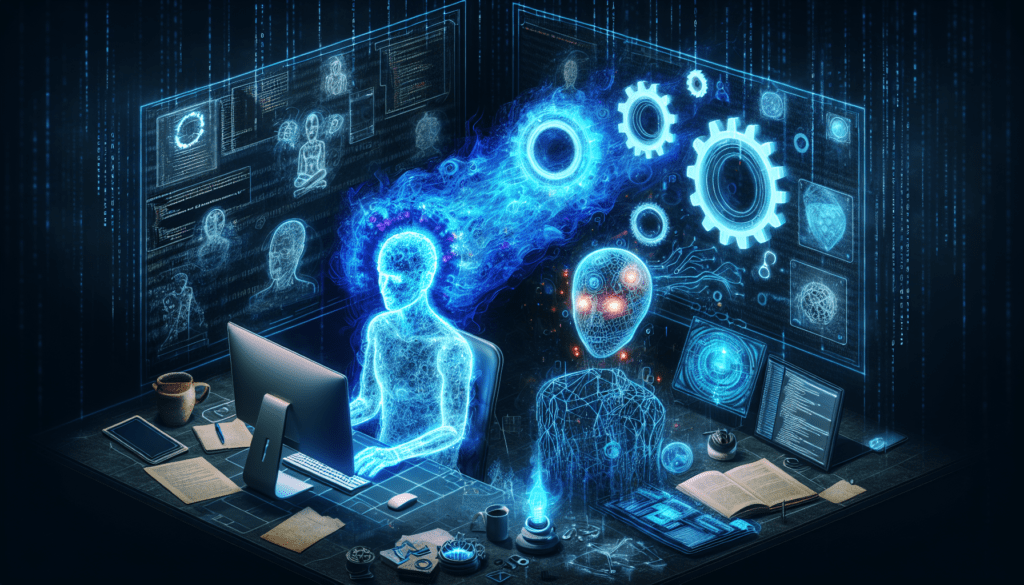
Devin AI, developed by Cognition Labs, marks a significant milestone in the software development industry, offering an AI-driven approach capable of overseeing the entire software development lifecycle. This revolutionary tool has sparked a mix of praise, skepticism, and concern among professionals, signaling a potential shift in how software engineering is approached.
As the discourse around Devin AI unfolds, questions about its impact on teamwork in software companies, its capabilities in testing, deployment, and collaboration, and its role in industries reliant on Python, JavaScript, and other programming languages are at the forefront. This article aims to explore Devin’s capabilities, weighing its pros and cons against human programmers and considering its future in the fast-evolving field of artificial intelligence .
Evaluating Devin AI’s Capabilities
Evaluating Devin AI’s capabilities reveals a sophisticated blend of technological innovation and practical application in software development. Key aspects include:
- Adaptive Problem-Solving and Learning:
- Emulates human problem-solving, adaptability, and creativity.
- Utilizes both supervised and unsupervised learning, analyzing code repositories and learning from past projects.
- Continuously improves by learning from its work.
- Code Generation and Debugging:
- Generates high-quality, efficient code for various applications.
- Capable of debugging, optimizing performance, and identifying inefficiencies.
- Demonstrated ability to build software end-to-end and fix bugs autonomously.
- Collaboration and Real-Time Feedback:
- Actively collaborates with users, incorporating feedback and making design choices.
- Responds to user prompts in natural language, adjusting plans during implementation.
Devin AI’s approach to software engineering combines autonomy, real-world problem-solving, and a high degree of adaptability, positioning it as a transformative tool in the industry.
Pros and Cons of AI in Software Development
Pros of AI in Software Development
- Increased Efficiency and Productivity: AI algorithms excel at automating repetitive tasks like debugging and testing, significantly reducing human error and increasing overall productivity .
- Improved Accuracy: More efficient than humans in identifying software flaws and errors.
- Enhanced Data Analysis: Capable of analyzing vast amounts of data for better decision-making.
- Innovation Drive: AI is at the forefront of new inventions across various fields, including healthcare and autonomous vehicles.
Cons of AI in Software Development
- Challenges in Complex Tasks: Devin AI, while advanced, struggles with jobs requiring deep understanding, creativity, and full context, areas where human programmers excel.
- Limited Creativity: AI follows set rules, potentially stifling innovation due to a lack of truly innovative ideas.
- Ethical and Security Concerns: Raises issues such as data privacy, algorithm bias, and vulnerability to hacking.
Economic and Professional Impact
- Job Market and Roles: AI’s automation capabilities may lead to job displacement in certain sectors but also create new roles such as AI wranglers, focusing human efforts on higher-level thinking and innovation.
- Cost Implications: Implementing AI requires significant investment, although it can lead to record-breaking profits for companies by making the market more competitive.
Devin AI vs. Human Programmers
When comparing Devin AI to human programmers, it’s essential to consider their unique strengths and how they complement each other in the software development lifecycle.
Devin AI’s Strengths:
- High Solo Success Rate: Achieves a 13.86% solo success rate in resolving issues end-to-end, significantly higher than previous AI technologies.
- Seamless Team Integration: Collaborates effectively with human engineers, enhancing the team’s capabilities.
- Versatile Applications: While focused on code generation, it also excels in tasks like debugging and optimizing performance.
Human Programmers’ Strengths:
- Creative Problem Solving: Excel at tackling complex problems with creativity and strategic thinking.
- Adaptability: Can analyze project goals, understand user needs, and adapt to unforeseen circumstances.
- Experience and Intuition: Leverage experience and intuition for out-of-the-box thinking and decision-making.
This comparison underscores that while Devin AI brings efficiency and innovation, human programmers remain indispensable for their creativity, adaptability, and strategic insights. The synergy of Devin AI and human intelligence is where the true potential for software development lies.
Future Outlook and Ethical Considerations
As we peer into the future, the integration of Devin AI into the fabric of software development ushers in a blend of opportunities and ethical considerations that cannot be overlooked:
- Ethical Design and Regulation:
- AI systems like Devin should embody ethical principles, ensuring they are transparent, controllable, and aligned with human values to foster trust and accountability.
- The complexity of AI regulation demands a collaborative effort among policymakers, educators, and industry stakeholders to navigate socio-economic challenges and promote inclusive growth.
- Enhancing Human Capabilities:
- Devin AI is envisioned to augment rather than replace human developers, emphasizing collaboration and upskilling to leverage AI’s strengths while maintaining human oversight.
- Ethical AI development must focus on enhancing human capabilities and addressing job displacement through retraining and fostering a culture of continuous learning.
- Addressing Societal Implications:
- The societal impact of AI, including concerns about privacy, surveillance, and embedded biases, necessitates a conscientious approach to minimize harm and ensure AI benefits humanity.
- Global cooperation and public interest theory play crucial roles in shaping AI development, aiming for a future where AI acts in the public interest, promoting social welfare, and empowering individuals.
As the discourse on Devin AI unfolds, it’s clear that this technological advancement marks a pivotal shift in the software development landscape. Evidently, the blend of Devin AI’s automation capabilities and human creativity and adaptability offers a path towards accelerating efficiency and innovation in software projects. Despite concerns over job displacement and ethical implications, the potential for Devin AI and human programmers to work in harmony presents an optimistic future for the industry. This synergy, embodying the strengths of both AI and human intelligence, lays down a foundational stone for the next era of software development.
Looking ahead, it is imperative for stakeholders across the board to engage in discussions surrounding the ethical integration and regulation of AI technologies like Devin. By emphasizing AI’s role in augmenting human capabilities rather than replacing them, we pave the way for a future where technological progress and human welfare coalesce. The journey with Devin AI at the forefront, intertwined with human creativity and strategic insight, beckons a transformative phase for software development, promising to redefine our approach to solving complex problems and pushing the boundaries of innovation.


